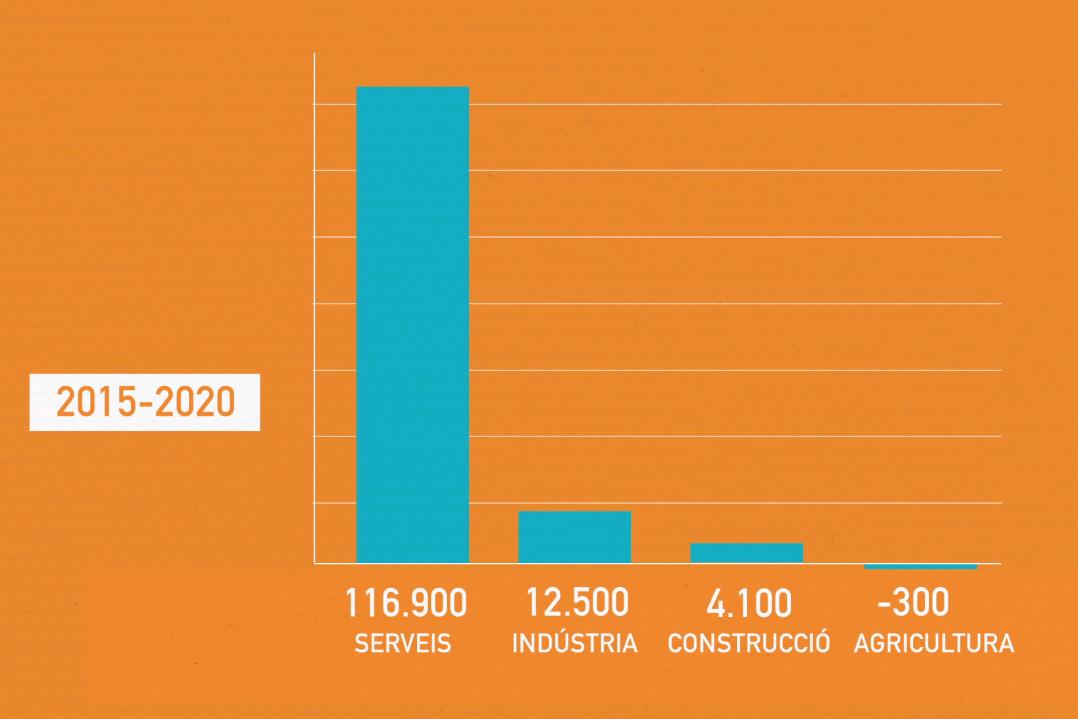09-04-2014
The Pacte Industrial de la Regió Metropolitana de Barcelona has presented its study entitled “A Forecast of the Employment and Training Needs of the Barcelona Metropolitan Region (2015 and 2020)”. The study provides strategic data on the trends of the employment market in the region, in order to help adapt the training on offer to meet future employment needs.
The study is a pioneering adaptation for the Barcelona Metropolitan Region of the study entitled “Skills Supply and Demand in Europe: Medium-Term Forecast up to 2020”, which was prepared by Cedefop (European Centre for the Development of Vocational Training) in 2010 and examines the trends of Europe’s future requirements in terms of skills. The European Commission recommends that Member States must improve their mechanisms for forecasting the evolution of the employment market.
The presentation took place in the Conference Hall of the El Vagó building, part of the Escola Industrial, and was made by Carles Ruiz, the Chair of the Executive Committee of the Pacte Industrial and Mayor of Viladecans; M. Rosa Fiol, the Chair of the Training Committee of the Pacte Industrial and Director-General of AEBALL; Oriol Homs, the Director-General of the CIREM Foundation and Study Coordinator; and Carles Rivera, the Managing Coordinator of the Pacte Industrial.
In his address, Carles Ruiz drew attention to the fact that “a successful strategy for industrial policy must be based on education and science”, and emphasised the importance of “adapting the current training model to meet the future needs of the employment market”. He went to state that municipalities “will be able to help plan training in the Barcelona Metropolitan Region by identifying employment and training needs at the local level”. On the same topic, Ruiz stressed the need for “collaboration between all agents in order to advance the proposals of the study, which could help create jobs over the course of the next five years”.For his part, Carles Rivera reaffirmed the commitment of the Pacte Industrial to continue its efforts to contribute to the debate and to improve the competitiveness of the Metropolitan Region.
RESULTS OF THE STUDY
1. The creation of 133,000 new jobs in the Barcelona Metropolitan Region is anticipated for the 2015-2020 period.
For the 2010-2020 period, the average annual variation in employment demand will be 0.60%, equivalent to the creation of 136,000 new jobs over the course of the decade. However, the majority of those jobs (around 133,000) will be created from 2015 onwards. During the period from 2015-2020, employment levels will mainly increase in the servicesector (116,900 jobs) and to a lesser extent in the industrial (12,500) and construction (4,100) sectors. There will be a slight decrease (-300) in the agricultural sector.
2. The commercial sector will see the greatest rise in employment for the 2015-2020 period.
With regard to the various areas of activity in the Barcelona Metropolitan Region for the 2015-2020 period, we can see that the sectors experiencing above-average growth will be commerce (1.97% annual growth and 35,100 jobs), property sales and lettings and professional and scientific services (1.98% and 27,900), the hotel industry (2.91% and 25.600) andartistic, cultural and entertainment activities, associations and other services (1.75% and 17,200).
3. 84% of the employment demand for the 2010-2020 period will come from replacement hiring.
The main conclusion of the study is that 84.2% of the employment demand up to the end of 2020 in the Barcelona Metropolitan Region will come from the hiring of replacement workers; i.e. employment that covers the future need to replace workers in existing positions as a result of migration, mobility between jobs and exits from the employment market (e.g. retirement, voluntary redundancy, death, etc.).
4. The employment demand will become more specialised and increase for those with professional training.
The projected trend for employment demand shows a major reduction in jobs for workers with a low level of education, who will be replaced by workers with an intermediate level of education. Likewise, it is noted that the employment demand will become more closely linked to greater specialisation and more professional training, given that the most significant increase in demand will be for workers withintermediate vocational trainingand advanced vocational training.Those with university qualifications will also experience a slight increase.
PROPOSED IMPROVEMENTS
The projections for employment growth in the Barcelona Metropolitan Region for the 2010-2020 period reveal the need to expand the active population in the long term, as well as the clear need to update and improve the skills of the currently active population in the short and medium term.
The priority areas highlighted in the study include the following:
- Increase the level of training for those with fewer skills, paying particular attention to young people.
- Experiment with the use of innovative formulas for employment and training.
- Develop training plans for those sectors with the greatest levels of potential growth.
- Increase investment in post-compulsory secondary education, paying particular attention to intermediate- and advanced-level training programmes.
- Promote training for the industrial sectors.
With regard to policies to boost the reindustrialisation of the Barcelona Metropolitan Region, it is necessary to promote activities that are related to ongoing projects and, in particular, the manufacturing industries and related support services. It will be necessary to identify the companies that have plans to innovate and reindustrialise, and develop a specific training plan to meet their needs in terms of skilled labour.
Links
Press release (in Catalan)

Pacte Industrial Dossier 9 (in Catalan)

